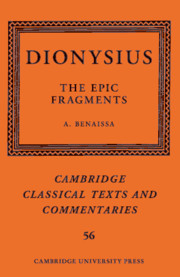Book contents
Preface
Published online by Cambridge University Press: 01 February 2018
Summary
Dionysius stands at an interesting juncture in the history of Greek hexameter epic, with lines taking us back to the learned poetry of the Hellenistic age and forward to the monumental epic poets of the Roman Imperial period. He is the only Greek writer of mythological epic poetry between Apollonius of Rhodes (third century BCE) and Quintus of Smyrna (third century CE) for whom we have relatively substantial fragments, and his work belongs to a period from which very little Greek poetry survives besides epigram. Two of his poems are known: a Gigantias in at least three books relating the battle of the Giants against the Olympian gods and its prehistory, and a Bassarica in at least eighteen books on Dionysus’ campaign against the Indian king Deriades. These works did not survive to medieval times, but sizeable fragments have been preserved in some papyri and in citations in the geographical dictionary of Stephanus of Byzantium. The Bassarica, the better preserved of the two poems, is the earliest known poetic account of Dionysus’ Indian war and an important literary precursor of the fullest elaboration of this legend, Nonnus’ Dionysiaca of the fifth century. Partly modelled on Alexander's eastern conquests, the legend was to prove enduringly popular in the Imperial and Late Antique periods, and Dionysius’ epic poem no doubt contributed to its growing vogue.
The last edition of Dionysius’ fragments was that of Enrico Livrea in 1973. This edition is fundamental in many respects, and it will be obvious throughout how much I am indebted to it. There are nevertheless several compelling reasons now for undertaking at least a re-edition of the Bassarica. Livrea omitted a number of entries from Stephanus of Byzantium which are almost certainly attributable to the poem, despite the fact that they do not cite Dionysius or the Bassarica explicitly. These entries, together with two new papyrus fragments from Oxyrhynchus, need to be incorporated in a more comprehensive edition of the poem. Close re-examination of the main papyrus of the Bassarica, P.Lond.Lit. 40, has also resulted in a significant number of corrections and new readings. Finally, several studies in the intervening decades have cast new light on some of the fragments.
- Type
- Chapter
- Information
- Dionysius: The Epic Fragments , pp. xi - xivPublisher: Cambridge University PressPrint publication year: 2018



